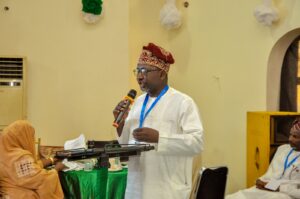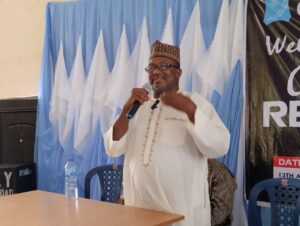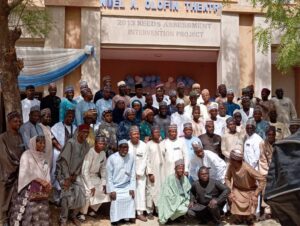
Today, after 26 years of graduation from Bayero University, we are reuniting for the first time to take what has been a collective entity to another level of a more united entity bound by the elements of brotherhood and love. You may recall that some of us spent five years from remedial course to level four, while others spent only three years as direct entry students. The end goal was to graduate with a BSc Geography/BSc Ed, which was then coordinated in three different faculties: Social and Management Sciences, Sciences and Education.
Today, Geography has moved from the Faculties of Science and Social and Management Sciences to a new Faculty, the Faculty of Earth and Environmental Sciences (FEES), with many other related disciplines particularly those in the built environment.
Ladies and gentlemen, our undergraduate journey was one characterised by love, understanding, and brotherhood, all in pursuit of a common objective. You will agree with me that our experience at the undergraduate level was one that taught us patience and understanding to weather through the storm of differences in culture, religion and social standing.
Our very deep interaction in the undergraduate journey, was halted at Level four, which marked the completion of our programme at Bayero University. The reunion today has its strong foundation from the seed sown in our undergraduate days. Our peaceful coexistence then has connected us despite the distances that separated us.
Today’s reunion further relegates any differences more so as we have matured through the years. I have the conviction that today’s reunion of Class ’98 will mark a turning point in our renewed efforts to transform into another entity of assisting, supporting, and advising ourselves with the view that whatever happened to any one of us happened to us all.
Factoring that in mind made us a more collective and indivisible entity in terms of safeguarding and protecting the interests of every member of Class ’98. This reunion objective is to further reinforce the strength of our togetherness in the service of our colleagues and also the service of Geography.
We have garnered a lot of experiences in different spheres of life in the past 26 years. Some of us here are security personnel, teachers, administrators, bankers, land experts, traders etc. These experiences have impacted in our lives transforming us into subjects or working tools of the different callings.

One cannot disconnect us from our undergraduate interactions which have prepared our minds for our current callings. Geography is still with us and will continue to be with us because the quality of the teaching given to us was one without any compromise and equally the mentoring in character prepared us to be potential recipient of BSc Geography based on learning and character.
Ladies and Gentlemen, in the ’60s, ’70s and early ’80s, Geographers played crucial roles in the development of National Development Masterplans. They provided the detailed description of both human and natural resources for the generation of an integrated framework for development.
The contribution of K.M. Buchanan and J.C. Pugh in Land and People in Nigeria in 1952 presented valuable facts concerning the geography of Nigerian development. In the volume, the two authors showed the sum total of human impact on natural environment. Another outstanding work was by Reuben Kenneth Udo on the Geographical Regions of Nigeria which if tapped into Nigeria will see the necessity for evolving a resource based economy.
A Geography of Nigerian Development, a collection of works by Geographers from diverse established background of years of academic experience in teaching and research in Geography further consolidated the conviction that Geography and Geographers were at the forefront of providing the needed materials for National Development. The understanding of different spatial scale of development by Geographers further gave them an edge over many disciplines when it comes to designing any intervention guided by spatial differences in locational factors.
Professor Akin Mabugunje, the first Professor of Geography in Africa, has left an indelible mark in the soil of Geography as his works in urban Geography have remained a reference guide in urban planning and other related discipline. He was the architect of the transformation that happened in Geography (paradigm shift), the application of quantification in the explanation of Geography. Mabogunje was also a force in housing and population development.
Others like Oguntoyinbo (Climate), Ayoade and Oyebode (Water Resources), Faniran (River Basins) Akintola (Mineral and Energy Resources), Areola (Soil and Vegetation), Pest and Diseases (Adejuwon), Population (Udo and Afolayan), Rural Development (Gana), Alao (Economic Geography), Ayeni (Urban Geography), Omolade (Political Geography), Okunrotifa (Manpower Development), Abumere (Development Geographies), Akinbode, Ogundana, Adalemo, (Trade), Onyemelukwe (Industrial), Mbagwu (Traditional Industry), Mortimore (Livelihood Suitability in Dryland), E.A. Olofin (Fluvial Geomorphology/Water Resources), Filani, Onakomaiya (Transportation), Afolabi Ojo (Toursim) and Eniola Adeniyi and Udo (Regional Development).
These diverse areas have indeed attested the relevance of Geography in National Development and have positioned it as a discipline that proper solution to problem particularly related to the complex interactions between man and his environment. The 50 Years of University Success Story of University of Ibadan, a collection of contributions, revealed the diverse application of Geographical enquiries with many researches conducted at this premier university meant for the development of this country.
There are many of such contributions in many Nigerian universities, including the Department of Geography Bayero University, Kano, particularly in the area of land resources administration and development. The Kano Society and Environment and Development, a masterpiece in 2014, chronicled the history of the state, revealed its human and natural resources and provided a framework for development and intervention in some sectors of the economy.
All these contributions with many others revealed the myriads of applications of Geography from its diverse areas governed by its inherent philosophy.
Geography as a discipline that can be used to explain everywhere being itself a multidisciplinary discipline. It is no secret that many researchers in other disciplines in their pursuit to make their works, appealing and simple, used maps as a tool to convey their messages. Among others is History, which with Geography are of critical relevance but somehow ignored in our society. In fact, many Ministries, Agencies and Departments in Nigeria cannot discharge their statutory responsibilities without Geographers.
Examples include Ministry of Interior, National Boundary Commission, National Population Commission, Federal Airport Authority of Nigeria, Nigerian Airspace Management Agency, River Basin Development Authorities, National Space Research Development Agency (NASDRA), Nigerian Environmental Standards and Regulations Enforcement Agency (NESREA), Nigerian Police Force, Nigerian Meteorological Agency, Ministry for Rural Development, Ministry of Transportation, Federal Roads Maintenance Agency FERMA, Ministry of Housing and Urban Development, Land and Physical Planning, Nigerian Ports Authority (NPA), National Oil Spill Detection and Response Agency (NOSDRA), Nigerian Emergency Management Agency (NEMA), National Drug Law Enforcement Agency (NDLEA), National Agency For The Prohibition of Trafficking in Persons (NAPTIP), Agriculture and Forestry, Ministry of Environment, Ministry of Commerce and Industry, the National Institute for Hospitality and Tourism (NIHOTOUR), News Agency of Nigeria (NAN), Ministry of Health, Ministry of Information, Financial Institutions (NDIC, AMCON, Banks etc), Development Partners (United Nations Funds for Population Activities UNFPA, United Nations International Children’s Fund, UNICEF, United States Agency for International Development, USAID, Foreign Commonwealth and Development Office, FCDO former UKAID and DFID, International Labour Organisation IOM, International Organisation for Migration IOM and many more but fundamentally Ministry of Education to develop manpower for the discipline.
The fluidity of Geography as a social science as well as a physical science make the discipline relevant for the actualisation of these MDAs responsibilities and its usefulness was found to be powerful driving force with attendant success.
It is disheartening to note that the Geography discipline that used to be the cornerstone of planning in Nigeria appears to be suffering neglect in the hands of policy makers over the years. This is not only disheartening, but alarming. Geography is no longer taught at some institutions that need the course most. An example at a close range is the nation’s only police highest institution, the Nigerian Police Academy, Wudil. Is there a country that can be policed effectively without the knowledge of Geography? The answer is a capital NO.
Geography is an indispensable tool for effective policing not only in Nigeria but across the globe. Sadly, too, Geography is now an optional subject in our secondary schools. That is why, today, the number of students applying for Geography in state and federal universities are fast declining.
I would like to, at this point, ask my teachers here present some few questions. These questions are questions whose correct answers I don’t think I do have. They are divided into three components.
Fundamental Question
i. Why is Geography descending the ladder?
Philosophy and Content of Geography
i. Was the philosophy of the discipline compromised over the years?
ii. Was there any generational leakages in terms of the philosophy and content of the discipline
iii. Are there square pegs in square holes in terms of teaching of Geography in our secondary schools, colleges of education and universities?
iv. Was there any deviation in teaching and research in Geography?
Geography in Time and Space
i. Are we doing the right Geography at the right time?
ii. Is Geography under the threat of technological advancement?
iii. Is Geography under threat by other disciplines?
iv. Does Geography need other discipline to survive?
v. Do other disciplines need Geography at all?
vi. Are the sub-fields of Geography still relevant and enough to address contemporary issues? If not, what can we do to reposition the discipline to be in consonance with current realities?
vii. Why is Geography not as visible as it was and not as recognised and respected as, equally, before? The present was not the future of Geography we foresaw.
Marketing Geography
i. Who promotes Geography?
For question number v, I can offer a little explanation, if there was any discipline which supposed to harness technological advancement it is Geography because of its multiple applications in space sciences. Geographical Information System (GIS) and remote sensing have now rooted themselves as modern tools of geographical analytics.
I could remember one prominent examination question on Remote Sensing Application, a level four course by the late Dr. Sebastian Patrick of blessed memory (pioneer in remote sensing research), “Remote Sensing Application is at Infancy Stage” Discuss. I believe if Patrick was alive he would have been a happy person witnessing the transformation of this area catalysed by technological advancement in space sciences before his eyes.
Permit me to mention here also on the visibility of Geography, the last question. Geography in the past used to be the mother of many disciplines and many have understood their disciplines from the lens of Geography. Some of these disciplines include Urban and Regional Planning, Environmental Management which are considered to be applied Geography.
Today, these disciplines are full blown programmes in many Nigerian Universities including Bayero University, our alma mater. Can we attribute the challenge of visibility of Geography to emergence of Geographical related disciplines? If today, Mabogunje was alive, he would put extra efforts to remain visible in the midst of urban planners despite his many contributions in that area.
In fact, I would like to mention here that one of our lecturers, Dr. Abubakar Liman, was examined at the University of Nottingham in his MSc programme by this academic icon, and Professor Falola was taught by Mabogunje at both undergraduate and postgraduate levels. The academic son of Mabogunje, Bola Yeni, taught another of our lecturers, Professor Yusuf Adamu.
One can visibly see the connection of these two disciplines not from far but with Environmental Management, the relationship is discernible.
Possible Way Forward
What should be done to take the geography to the next ladder? A radical transformation is imperative through teaching the lower levels the philosophy and content of Geography to prepare their minds on the importance of Geography and its usefulness. The recruitment of goods hands from diverse areas of Geography will be a timely intervention.
I could remember during our days when we can visibly notice the heterogeneous composition of the lecturers in the Department, they were the best diversity ever attained. This transcends Urban, Rural, Economic, Fluvial Geomorphology, Soil Evaluation, Hydrology and Water Resource Evaluation, Remote Sensing, Cartography, Urban Planning, Climatology, Land Evaluation, Biogeography, and Population Geographies to mention a few.
The use of quantification in the analysis of Geographical issue should not be to the neglect of qualitative analysis. Mixed method is the way to go! My supervisor, a quantitative man of repute, told me to use descriptive statistics in my entire PhD research, something which I found to be very applicable and relevant in addressing the subject matter. The tables and charts are there revealing the message.

Geography is not only a pure science discipline but also a social science, it is at the interphase of the two. Also, Geographers should do Geography focusing the application to societal development.
I am very optimistic that if it was the Geography of before, they would have found the Geographical explanation from a reactionary approach to the current problem of Palestine and Israel, Ukraine and Russia and many other similar issues. This is the power of Geography in the explanation of development.
Conclusion
Geography as discipline of description will continue to play a critical role in the Nigeria’s development. The discipline has reached an apex and its benefit is all over the place. What can we do on our part as products of Geography to promote Geography? Wherever we are, let us amplify its usefulness, prove ourselves through hard work and let us be ambassadors and advocates of Geography. Together, we can make Geography great again and again.
Finally, I would like to pay tribute to our departed teachers, Professor Emmanuel Olofin, Mr. N. Oyeniyi, and Dr Sebastian Patrick, who are resting in the bosom of the Lord, and Professor Ahmed Abdulkadir, Professor Kabiru Ahmed, Malam Aliyu Dan Shehu Maiwada and Professor Ibrahim Baba Yakubu, may all their souls rest in peace, ameen.
To our departed colleagues, DSP Dahiru Ibrahim Majiya, Rayyanu Garba, DSP Shehu Adamu Gololo, Pastor Monday Obaromi; may their souls rest in perfect peace. To our colleague, Auwal Lukman, who is suffering from partial paralysis, we pray for his speedy recovery.
Thank you for listening, while wishing you safe trip back to your respective destinations. Na gode.
* Dr. Nura Ibrahim Hassan, a member of Geography Class of 1998, Department of Geography, Bayero University, Kano State, delivered this lecture at the Emmanuel Olofin Theatre, Faculty of Earth and Environmental Sciences, Bayero University, Kano, Nigeria, on April 13, 2024
